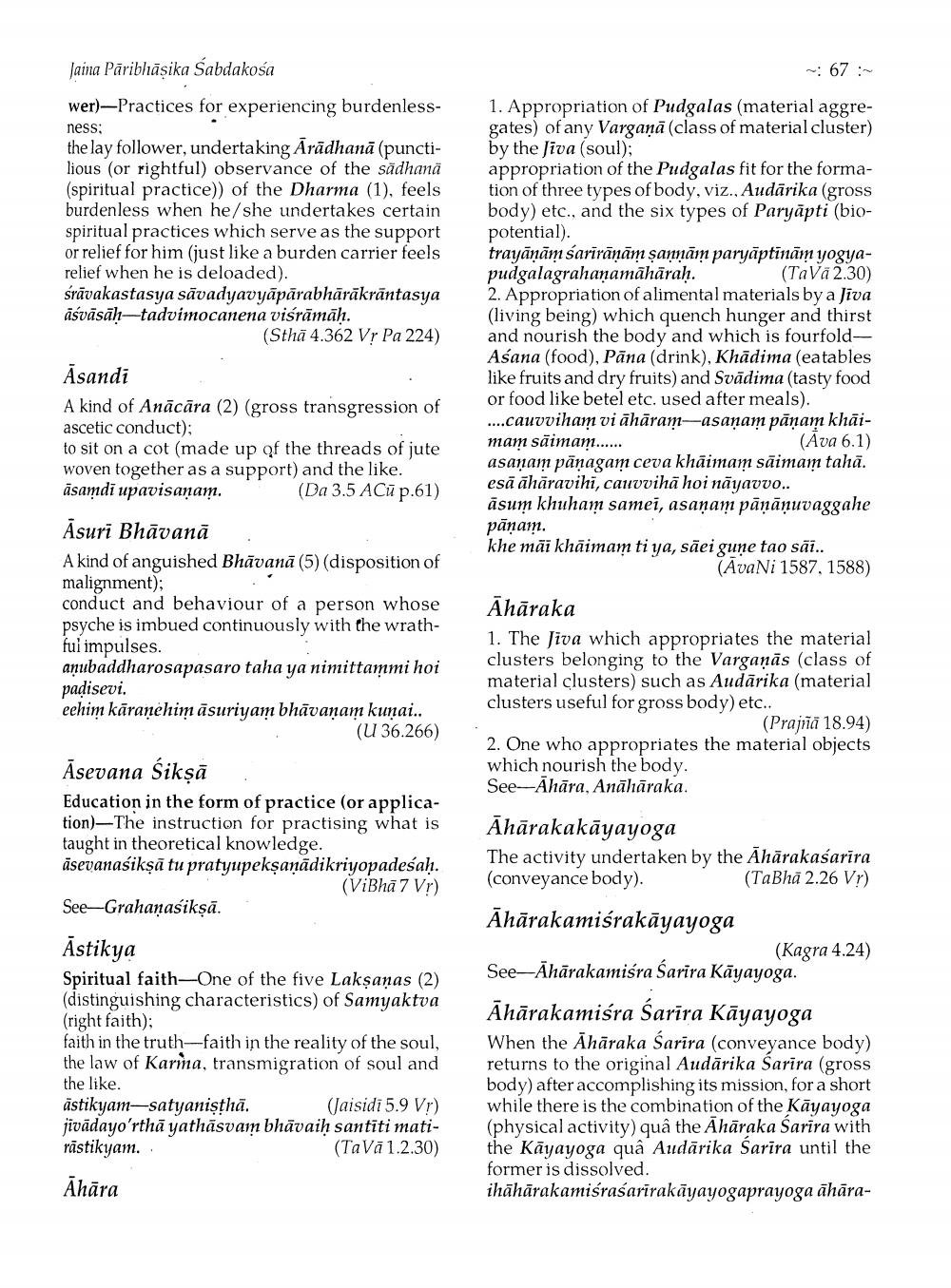________________
- 67:
Jaina Pāribhāșika Sabdakosa wer)—Practices for experiencing burdenlessness; the lay follower, undertaking Ārādhanā (punctilious (or rightful) observance of the sādhana (spiritual practice)) of the Dharma (1), feels burdenless when he/she undertakes certain spiritual practices which serve as the support or relief for him (just like a burden carrier feels relief when he is deloaded). srāvakastasya sāvadyavyāpārabhārākrāntasya āsvāsāh-tadvimocanena visrāmāh.
(Sthā 4.362 Vr Pa 224)
1. Appropriation of Pudgalas (material aggregates) of any Vargaņā (class of material cluster) by the Jiva (soul); appropriation of the Pudgalas fit for the formation of three types of body, viz., Audārika (gross body) etc., and the six types of Paryāpti (biopotential). trayāņām sarīrāņām sannām paryāptinām yogyapudgalagrahanamāhāraḥ.
(Tavā 2.30) 2. Appropriation of alimental materials by a Jiva (living being) which quench hunger and thirst and nourish the body and which is fourfoldAsana (food), Pāna (drink), Khādima (eatables like fruits and dry fruits) and Svādima (tasty food or food like betel etc. used after meals). ....cauvviham vi āhāram-asanam pāņam khāimam sāimam......
(Ava 6.1) asaņam pāņagam ceva khāimam sāimam tahā. esā āhāravihi,cauvvihā hoi nāyavvo.. āsum khuham samei, asaņam pāņāņuvaggahe pānam. khe mãi khāimam ti ya, sāei gune tao säi..
(AvaNi 1587, 1588)
Āsandi A kind of Anācāra (2) (gross transgression of ascetic conduct); to sit on a cot (made up of the threads of jute woven together as a support) and the like. āsamdi upavisanam. (Da 3.5 ACū p.61)
Asuri Bhāvanā A kind of anguished Bhāvanā (5) (disposition of malignment); conduct and behaviour of a person whose psyche is imbued continuously with the wrathfui impulses. anubaddharosapasaro taha ya nimittammi hoi padisevi. cetim kārameltim äsuriyan bhāoanam kunai..
(U 36.266)
Ahāraka 1. The Jiva which appropriates the material clusters belonging to the Vargaņās (class of material clusters) such as Audārika (material clusters useful for gross body) etc..
| (Prajna 18.94) 2. One who appropriates the material objects which nourish the body. See-Ahāra, Anāhāraka.
Āsevana Śikṣā Education in the form of practice (or application)-The instruction for practising what is taught in theoretical knowledge. āsevanaśikṣā tu pratyupeksaņādikriyopadeśaḥ.
(ViBha 7 Vr) See-Grahaņasikṣā.
Ahārakakāyayoga The activity undertaken by the Āhārakasarira (conveyance body).
(TaBhā 2.26 Vr)
Āhārakamiśrakāyayoga
(Kagra 4.24) See-Ahārakamisra Śarira Kāyayoga.
Āstikya Spiritual faith-One of the five Laksanas (2) (distinguishing characteristics) of Samyaktva (right faith); faith in the truth-faith in the reality of the soul, the law of Karma, transmigration of soul and the like. āstikyam-satyanisthā. (Jaisidi 5.9 Vr) jivādayo'rthā yathāsvain bhāvaih santiti matirāstikyam.
(Tavā 1.2.30)
Ahārakamisra Sarira Kāyayoga When the Ahāraka Sarira (conveyance body) returns to the original Audārika Sarira (gross body) after accomplishing its mission, for a short while there is the combination of the Kāyayoga (physical activity) quâ the Āhāraka Sarira with the Kāyayoga quâ Audārika Sarira until the former is dissolved. ihāhārakamisrasarīrakāyayogaprayoga āhāra
Ahāra




